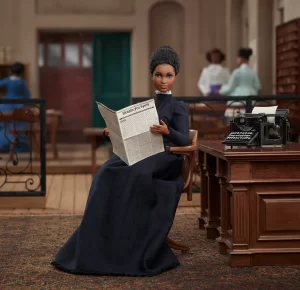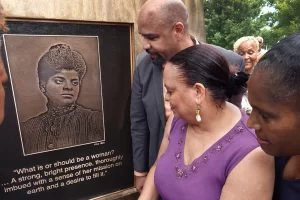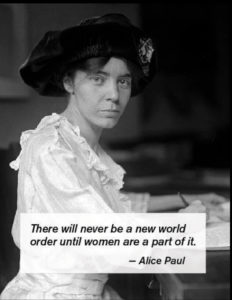Women’s Suffrage
Memphis Free Speech
January 11, 2022The new Barbie doll of journalist and activist Ida B. Wells.
Jason Tidwell/Mattel
I had a Skipper and a Scooter. I wish I could have had an Ida B. -dayle
Journalist Ida B. Wells is commemorated with a Barbie doll for fearless activism
NPR
by Elizabeth Blair
Educator, journalist, anti-lynching activist and NAACP co-founder Ida B. Wells joins the pantheon of distinguished women honored by Mattel with her own signature Barbie doll. Resplendent in a deep blue, floor-length dress with lace details, the new Ida B. Wells doll also comes with a historically significant accessory: a miniature replica of the Memphis Free Speech, the newspaper where Wells became editor and co-owner in 1889.
Mattel has created numerous Barbie dolls to honor both historic and contemporary heroines in the hopes of inspiring “generations of girls to dream bigger than ever before.” It’s Inspiring Women Series includes dolls dedicated to Maya Angelou, NASA mathematician Katherine Johnson and singer Ella Fitzgerald.
The oldest of eight children, Ida B. Wells was born into slavery in Holly Springs, Miss., in 1862. When she was 16, both of her parents and a younger brother died during the yellow fever epidemic. Wells raised her younger siblings and became a teacher to support her family.
Daniel and Michelle Duster attend the dedication of a monument to their great-grandmother, journalist, educator, and civil rights leader, Ida B. Wells in Chicago last year.
Scott Olson/Getty Images
“I am honored that Barbie has chosen to celebrate my great-grandmother, Ida B. Wells, as part of its Inspiring Women Series,” says Michelle Duster, author, public historian, and great-granddaughter of Ida B. Wells in a statement. “My great-grandmother was a trailblazer, who courageously followed her convictions and challenged the status quo by fighting for civil rights and women’s suffrage. This is an incredible opportunity to shine a light on her truth and enduring legacy to empower a new generation to speak up for what they believe in.”
A pivotal moment in Wells’ life came in 1883 when she was traveling by train from Memphis to Woodstock, Tenn., where she was a teacher. When she refused to give up her seat and ride in a segregated car, she was forcibly removed. Wells later sued the Chesapeake, Ohio and Southwest Railroad Co. A local court ruled in her favor but the decision was eventually overturned in federal court.
Wells became a fierce anti-lynching activist. She investigated white mob violence and wrote scathing indictments of the lynchings of Black men. Her articles so angered locals, the offices of the Memphis Free Speech were destroyed.
In the preface to her 1892 pamphlet Southern Horrors: Lynch Laws In All Its Phases, Wells wrote, “It is with no pleasure I have dipped my hands in the corruption here exposed. Somebody must show that the Afro-American race is more sinned against than sinning, and it seems to have fallen on me to do so.”
“The Power of Citizenship”
March 19, 2018ASPEN INSTITUTE
“What do you think Americans should know to be civically and culturally literate?”
Lesson’s from the Women’s Suffrage Movement
No matter what one’s political leanings, everyone can learn from the history of the women’s suffrage movement.
Although (Alice) Paul may not be as well-known as Susan B. Anthony, Eleanor Roosevelt or Martin Luther King, Jr., all owe her a debt as her tactics of civil disobedience would become the tools of the push for Civil Rights and other movements. Her championing of equal rights would help shape the United Nations Charter, alongside the efforts of Eleanor Roosevelt. And Paul’s leadership also helped establish the permanent UN Commission on the Status of Women.
Alice Paul had cut her teeth in England, learning from activists how to get people’s attention for women’s rights by staging parades, street meetings, and protests, which led to her arrest and imprisonment. She put these lessons to work in the US, too. President Woodrow Wilson was appalled by Paul and her “unladylike” tactics, which she used in her public protests for women’s voting rights outside the White House and elsewhere in Washington.
In the same year, Paul spent seven months in prison for her civil disobedience, but she was not alone. Of her fellow demonstrators, about 500 were arrested, and 168 served prison sentences for their participation. While in jail, Paul led a hunger strike and was force-fed along with other women of the NWP, who demanded to be considered political prisoners rather than criminals.
Although they had sometimes been beaten by bystanders outside the White House, and called unpatriotic and worse during World War I, the NWP still fueled general outrage in the press and public. Under pressure from growing public support for women’s suffrage, Wilson finally relented in his opposition and offered his backing for an amendment. The Senate subsequently passed the Susan B. Anthony Amendment for equal suffrage on June 4, 1919.
The 19th Amendment to the US Constitution was ratified by the required three-fourths of the states and became law just before the 1920 election.
[full article: https://www.aspeninstitute.org/blog-posts/lessons-womens-suffrage-movement/]


